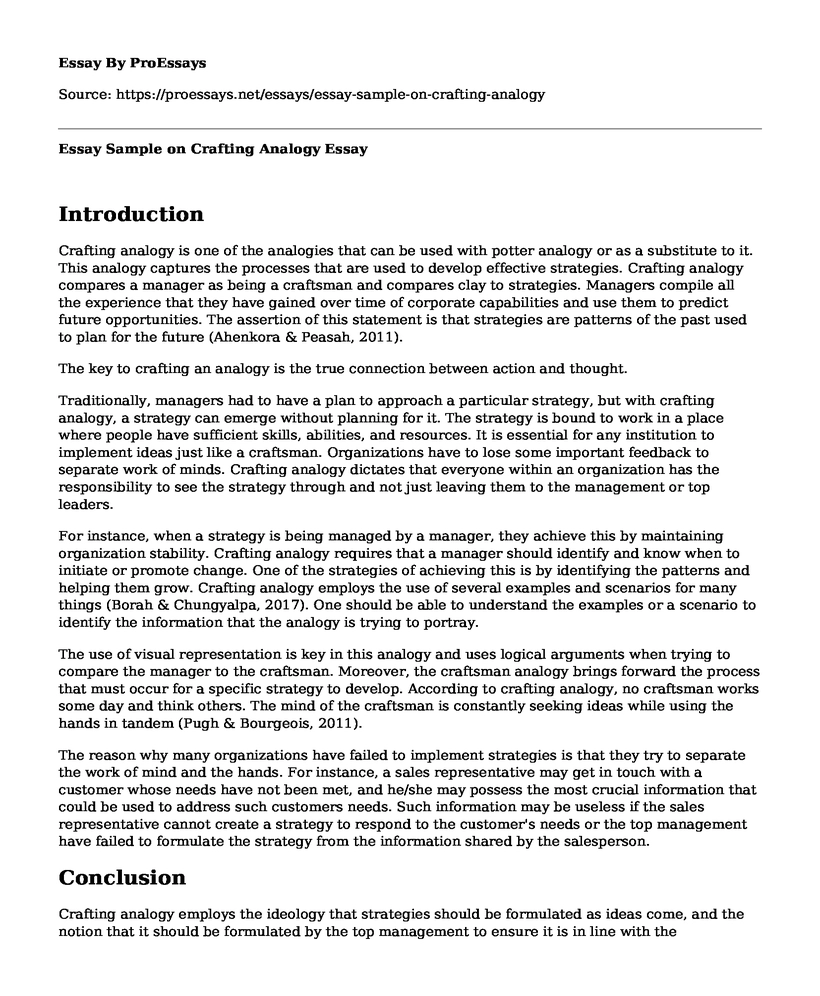Introduction
Crafting analogy is one of the analogies that can be used with potter analogy or as a substitute to it. This analogy captures the processes that are used to develop effective strategies. Crafting analogy compares a manager as being a craftsman and compares clay to strategies. Managers compile all the experience that they have gained over time of corporate capabilities and use them to predict future opportunities. The assertion of this statement is that strategies are patterns of the past used to plan for the future (Ahenkora & Peasah, 2011).
The key to crafting an analogy is the true connection between action and thought.
Traditionally, managers had to have a plan to approach a particular strategy, but with crafting analogy, a strategy can emerge without planning for it. The strategy is bound to work in a place where people have sufficient skills, abilities, and resources. It is essential for any institution to implement ideas just like a craftsman. Organizations have to lose some important feedback to separate work of minds. Crafting analogy dictates that everyone within an organization has the responsibility to see the strategy through and not just leaving them to the management or top leaders.
For instance, when a strategy is being managed by a manager, they achieve this by maintaining organization stability. Crafting analogy requires that a manager should identify and know when to initiate or promote change. One of the strategies of achieving this is by identifying the patterns and helping them grow. Crafting analogy employs the use of several examples and scenarios for many things (Borah & Chungyalpa, 2017). One should be able to understand the examples or a scenario to identify the information that the analogy is trying to portray.
The use of visual representation is key in this analogy and uses logical arguments when trying to compare the manager to the craftsman. Moreover, the craftsman analogy brings forward the process that must occur for a specific strategy to develop. According to crafting analogy, no craftsman works some day and think others. The mind of the craftsman is constantly seeking ideas while using the hands in tandem (Pugh & Bourgeois, 2011).
The reason why many organizations have failed to implement strategies is that they try to separate the work of mind and the hands. For instance, a sales representative may get in touch with a customer whose needs have not been met, and he/she may possess the most crucial information that could be used to address such customers needs. Such information may be useless if the sales representative cannot create a strategy to respond to the customer's needs or the top management have failed to formulate the strategy from the information shared by the salesperson.
Conclusion
Crafting analogy employs the ideology that strategies should be formulated as ideas come, and the notion that it should be formulated by the top management to ensure it is in line with the organization policies and standards is the biggest fallacies of conventional strategic management. This explains why many public policies and businesses are failing dramatically today. When used together with potter analogy, they could simply be converted into patterns and become deliberate if the patterns can be identified and verified by the top leadership (Pugh & Bourgeois, 2011). This analogy of comparing craftsman and the manager is new but is promisingly effective.
References
Ahenkora, K., & Peasah, O. (2011). Crafting Analogy That Measures Up. International Journal Of Business And Management, 6(10). doi: 10.5539/ijbm.v6n10p278
Borah, S., & Chungyalpa, W. (2017). Crafting Strategic Objectives: Examining the Role of Business Vision and Mission Statements. Journal Of Entrepreneurship & Organization Management, 06(01). doi: 10.4172/2169-026x.1000205
Pugh, J., & Bourgeois, L. (2011). "Doing" strategy. Journal Of Strategy And Management, 4(2), 172-179. doi: 10.1108/17554251111128637
Cite this page
Essay Sample on Crafting Analogy. (2022, Dec 22). Retrieved from https://proessays.net/essays/essay-sample-on-crafting-analogy
If you are the original author of this essay and no longer wish to have it published on the ProEssays website, please click below to request its removal:
- Ethics in Immigration Bans and Deportation Essay
- Essay Example on Teen Identity Formation: Exploring Music and Collective Identity
- Essay Example on Marxism: Exploring Social Development and Human Nature
- Essay Example on Mom Teaches Daughter Life-Lessons: Benefits of Moral Values
- Socrates: Father of Western Philosophy & The Socratic Method - Essay Sample
- Essay Sample on Justice in States and Souls: Plato's Stance
- Implementing Ethical Culture in Robo Inc.: Characteristics and Global Implications - Essay Sample







